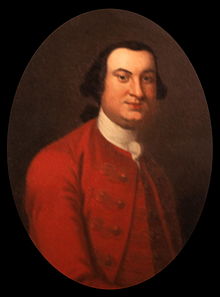Henri Bouquet
Henri Louis Bouquet (* 1719 in Rolle , Switzerland ; † September 2, 1765 in Pensacola , Florida ), known to the British as Henry Bouquet , was a Swiss mercenary in the service of the Netherlands , the Kingdom of Sardinia and the British Crown . He was best known for his colonial deployment in North America.
Career
Bouquet grew up in Rolle in the Swiss canton of Vaud as the son of an innkeeper and trader. It was difficult to find a job in the rural area, so Bouquet decided to do military service. He then did this in the Netherlands, Sardinia and again in the Netherlands.
Military service in North America
During the Seven Years War , Bouquet took up the post of inspector of British forts in North America in 1756 as a lieutenant colonel. Bouquet was involved in building the Royal American Regiment and in building Fort Pitt - today's city of Pittsburgh .
Bouquet soon made good contacts with Cherokee Indians, who were allied with the British. From them he adopted parts of their way of fighting in the woods and integrated them into the British way of fighting. He reorganized his companies from permanent formations into lone fighters.
In 1762 various Indian tribes began to rise under the leadership of Pontiac against the spreading British ( Pontiac uprising ). They conquered various forts. From June 22, 1763, Pontiac's warriors besieged Fort Pitt. Henri Bouquet rushed to the fort with his Royal Americans. After a forced march, the exhausted British were attacked by Pontiac's warriors on August 5 near the Bushy Run outpost . The British were in dire straits at the beginning of the battle , but were then able to lure and defeat the Indians thanks to a fictitious retreat. Bouquet and his men arrived at Fort Pitt on August 20th.
After the victory, the British bloodbathed the defeated and took their scalps away . Bouquet even considered distributing blankets contaminated with smallpox to the Indians, but ultimately rejected this idea for fear of infecting his own men. Bouquet received the highest praise for his leadership in combat. Many important chiefs had lost their lives in the battle; the Indian revolt was broken and the hinterland was free for white colonization. Bouquet himself advanced over the Ohio River to the west and negotiated there with the rebellious Indians. With cunning tricks, threats, promises and delaying, he was ultimately able to achieve a brilliant victory here too. The result of the negotiations went down in history as the Peace of Muskingum .
End of life
The military victory followed by the diplomatic victory earned Bouquet great respect. He became an honorary citizen of dozens of cities on the Atlantic coast. The British were unable to support Bouquet's campaign financially and it is likely that Bouquet had to pay a large part of the costs himself. Not least because of this, he wanted to retire from military service. An offer to the Brigadier General and Governor of Florida made him rethink. He died of yellow fever just a week after arriving in Florida .
literature
- Karl Lüönd : Swiss in America. Careers and Failures in the New World. Book Club Ex Libris, Zurich 1981
- Ernie Hearting : The Indian Colonel. From Lake Geneva to the North American jungle. Life and adventures of the Swiss Henri Bouquet, an officer in the English service . Einsiedeln: Waldstatt Verlag, 1965
| personal data | |
|---|---|
| SURNAME | Bouquet, Henri |
| ALTERNATIVE NAMES | Bouquet, Henry; Bouquet, Henri Louis |
| BRIEF DESCRIPTION | Swiss mercenaries |
| DATE OF BIRTH | 1719 |
| PLACE OF BIRTH | Rolle VD , Switzerland |
| DATE OF DEATH | September 2, 1765 |
| Place of death | Pensacola (Florida) , Florida |
